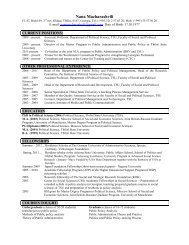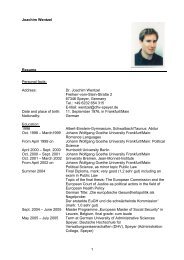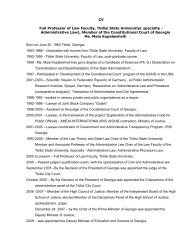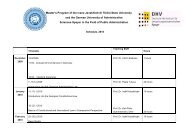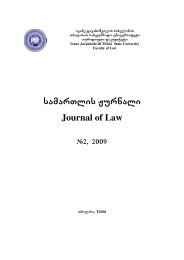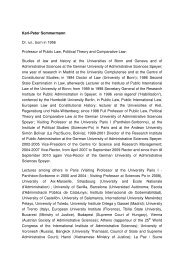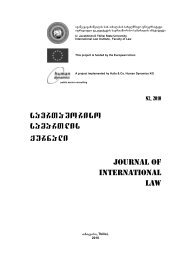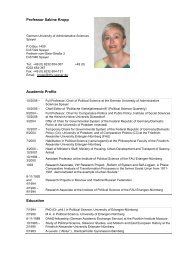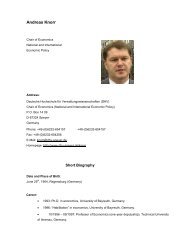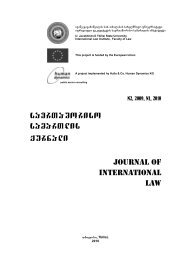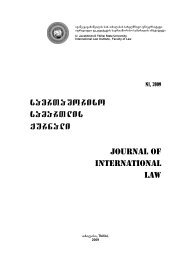Untitled
Untitled
Untitled
You also want an ePaper? Increase the reach of your titles
YUMPU automatically turns print PDFs into web optimized ePapers that Google loves.
saerTaSoriso samarTlis Jurnali, #1, 2008 JOURNAL OF INTERNATIONAL LAW, N1, 2008<br />
tant role in further decision making process in<br />
relations to dual nationality, for instance numerous<br />
decisions were made by Italian-American<br />
Tribunal as well as by Iran-American Tribunal<br />
under the principle of effective nationality.<br />
64 In A/18 case Iran-American Tribunal,<br />
relying on decisions on Mergi and Nottebohm<br />
cases, established that issue of dual nationality<br />
should be solved according to particular<br />
circumstances of each case by defining effective<br />
nationality of a citizen. 65 The principle of<br />
effective nationality was frequently used in<br />
future by the Tribunal, among them, in one of<br />
the cases the Tribunal declared that in present<br />
case the theory of effective nationality was the<br />
way of solution which was mostly in conformity<br />
with the principles of public international<br />
xlaw. 66<br />
Thus, as we see the contemporary international<br />
law practice aims at making exception<br />
from the oldest doctrine on "exclusion of<br />
responsibility". Furthermore, the International<br />
Law Commission included these exceptions<br />
also in draft Articles. In accordance with Article<br />
7 "a State of nationality may exercise diplomatic<br />
protection in respect of a person<br />
against a State of which that person is also a<br />
national unless the nationality of the former<br />
State is predominant, both at the date of injury<br />
and at the date of the official presentation<br />
of the claim". 67 It is obvious that, apart from<br />
effective nationality necessary requirement is<br />
to establish dominant bond of nationality at<br />
the date of injury and at the date of the official<br />
presentation of the claim. 68 Numerous factors<br />
may be taken into consideration while determining<br />
effective nationality. As it was mentioned<br />
in one of the cases by French-German<br />
mixed Tribunal, a person shall be considered<br />
as a national of that country to which he/she<br />
has not only legal but factual bond as well. 69<br />
This may include the living period in the country,<br />
date of acquiring nationality, place of education,<br />
language of education, employment<br />
and financial interests, place of family life, family<br />
ties in the State, participation in social and<br />
public life, taxation, bank accounts, insurance,<br />
visits in other State of nationality, possession<br />
and use of passport, military service, etc. 70 In<br />
order to establish effective tie Permanent<br />
Court of Arbitration in "Canevaro" case took<br />
into consideration the fact that the person was<br />
standing for candidacy of the Senate of Peru<br />
and later agreed to become honorary consul<br />
of Peru in the Kingdom of Netherlands. 71 However<br />
it shall be mentioned that none of the<br />
abovementioned factors is decisive and the<br />
weight and importance attributed to each factor<br />
will vary according to the circumstances of<br />
each case. 72<br />
3.3. Principle of "Continuous Nationality"<br />
Second problem concerning the nationality<br />
is the principle of "continuous nationality".<br />
The core of the principle is that only nationality<br />
tie between the State and a person is not<br />
enough to legitimate exercise of diplomatic<br />
protection by the State, but a person shall be<br />
a national of a State both for the moment of<br />
committing crime and particular stage of legal<br />
proceedings. One of the aims of this rule is to<br />
avoid delivering the right of initiating dispute<br />
by the nationals of small States to big States. 73<br />
According to opinions of highly qualified<br />
scholars of international law the States give<br />
the obligatory nature the rule that nationality<br />
tie must exist both for the moment of injury<br />
and particular stage. Ian Brownlie noted that,<br />
there is no agreement on the second part of<br />
this rule; in particular, how long the continuity<br />
of nationality must last. 74 There are several<br />
approaches regarding this issue, in particular,<br />
a phase, up to which the continuous nationality<br />
principle must be protected is different:<br />
initiation of diplomatic negotiations, filing<br />
of the claim, signature, ratification or entry into<br />
force of the agreement referring the dispute<br />
to arbitration, conclusion of the oral hearing,<br />
delivery of judgment and execution of award,<br />
etc. 75 In the opinion of Feller and Oppenheim,<br />
following the practice of States, more acceptable<br />
for States is to retain nationality until the<br />
official presentation of the claim. 76 Though, it<br />
shall be mentioned that several years ago in<br />
2003 International Center for Settlement of Investment<br />
Disputes (ICSID) arbitral tribunal in<br />
its decision declared that continuity of nationality<br />
must last until the final judgment of the<br />
Court. 77<br />
As we see the abovementioned provision<br />
is one more restricting factor for exercising of<br />
diplomatic protection. In addition if we take into<br />
consideration that a national has to attempt<br />
to resolve a dispute by internal remedies, further<br />
to wait for the decision of the State to exercise<br />
diplomatic protection on his/her behalf,<br />
initiation of the dispute and conclusion of a<br />
244



